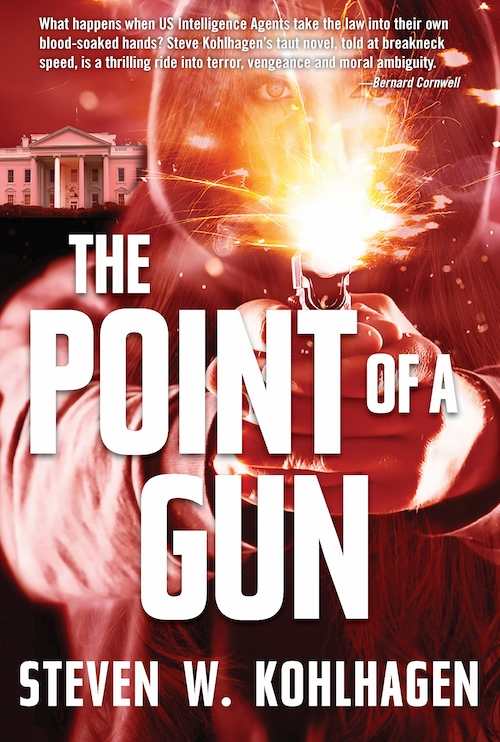
The Point of a Gun
Force must meet force in this novel, where direct action by independent professionals is the only way to stop terrorism.
The Point of a Gun is a dystopian thriller that could very easily happen, and soon. Steven W. Kohlhagen’s taut and tense political action story lays bare the potential for terrorism, arguably the contemporary world’s greatest scourge, to dismantle American society with just a few more attacks.
Because the United States government is incapable of stopping domestic terrorism due to politics, the limitations of the law, bureaucratic infighting, and the hindrance known as the Constitution, a secretive group calling itself the Paladins forms in order to bring extralegal justice to America’s enemies. These vigilantes not only take cues from the vigilance committees of the Old West, but they also utilize their military and intelligence skills in order to disrupt suicide bombings and even nuclear attacks.
The deep state insiders of Washington support the Paladins mostly because they are successful. But the president wants the vigilantes either brought to justice or completely co-opted by legitimate channels. The only problem is that nobody knows for sure who the Paladins are. Even worse, the vigilantes are better at collecting intelligence and covering their tracks than are the FBI, CIA, NSA, DHS, and all the other acronyms.
The Point of a Gun is often a grim book. It explores just how handicapped the federal government is when it comes to the ever-evolving terrorist networks that threaten the West.
ISIS and Al-Qaeda get starring roles, but the novel also details one cyber-attack plot by a militia group and a pair of neo-Nazi terrorists hell-bent on attacking worship centers in the South. With this range, it starts to depict a domestic threat that is immense to the point of absurdity.
While it includes great action scenes and presents hard truths about the state of the world, the book jumps from foiled terrorist attack to foiled terrorist attack with only dry government meetings in between. At one point, when the book should be climbing toward its climax, it details a failed terror attack in Jackson, Mississippi, that could have as usefully wound up on the cutting room floor.
The only thing that ties the book together is the federal government’s quest to uncover the true identities of the Paladins. As for the vigilantes themselves, they are roughly drawn characters without much personality. Only the mysterious May, a former marine and a refugee from Myanmar, has true depth.
Force must meet force in this novel where direct action by independent professionals is the only way to stop terrorism.
Reviewed by
Benjamin Welton
Disclosure: This article is not an endorsement, but a review. The publisher of this book provided free copies of the book and paid a small fee to have their book reviewed by a professional reviewer. Foreword Reviews and Clarion Reviews make no guarantee that the publisher will receive a positive review. Foreword Magazine, Inc. is disclosing this in accordance with the Federal Trade Commission’s 16 CFR, Part 255.
